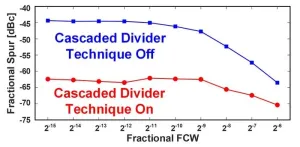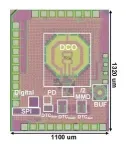(Press-News.org)
Two innovative design techniques lead to substantial improvements in performance in fractional-N phase locked loops (PLLs), report scientists from Tokyo Tech. The proposed methods are aimed to minimize unwanted signals known as fractional spurs, which typically plague PLLs used in many modern radar systems and wireless transceivers. These efforts could open doors to technological improvements in wireless communication, autonomous vehicles, surveillance, and tracking systems in beyond 5G era.
Many emerging and evolving technologies, such as self-driving vehicles, target tracking systems, and remote sensors, rely on the high-speed and error-free operation of wireless data transceivers and radar systems. In these applications, phase locked loops (PLLs) are crucial components that help with the synthesis, modulation, and synchronization of oscillating signals. Thus, eliminating or minimizing sources of error in PLLs is essential to improve the overall performance of systems.
In fractional-N PLLs, a popular type of PLL with excellent resolution and flexible control of frequency, jitter and fractional spurs are mainstay enemies. “Jitter” refers to the overall deviation from the ideal timing of the synthesized oscillation. On the other hand, fractional spurs are unwanted signals that arise from the periodicity in the error. Components called digital-to-time converters (DTCs) are typically used in the digital PLLs to cancel the quantization error, but imperfections in DTCs due to so-called “integral non-linearities (INLs)” ultimately manifest as fractional spurs that degrade phase noise in the output of the PLL.
In a recent study, a research team from Tokyo Institute of Technology (Tokyo Tech), led by Professor Kenichi Okada, sought to address these problems through the development of two innovative design techniques leading to a low-spur fractional-N PLL. Their work has been published in the Proceeding of the 2024 IEEE International Solid-State Circuits Conference (ISSCC).
The first proposed technique involves the use of a cascaded-fractional divider. This method involves splitting the frequency control word (FCW), an internal PLL signal that controls the output frequency, into two but in a way that both are far from an integer value. The logic underlying this is that for far-integer FCWs, fractional spurs appear in the PLL in higher frequencies, and high-frequency components are naturally filtered out by the inherent operations of the PLL (Figure 1). Notably, this approach does not involve digital pre-distortion (DPD), a technique that introduces complexity and causes slower phase locking.
The second proposed technique revolves around a pseudo-differential DTC to avoid the pitfalls of standard DTC implementations (Figure 2). “In conventional DTC designs, there are stringent trade-offs between the DTC power, delay range, noise, and INL, limiting the minimum fractional-spur level achievable,” explains Prof. Okada. To tackle this issue, the researchers noted that the non-linearities of DTCs contain even symmetric components. Accordingly, they implemented the function of a single DTC using two half-range DTCs with the same even-symmetric INLs in differential operation. As a result, these INLs were naturally cancelled out via subtraction at the PLL’s phase detector.
The team tested their ideas by implementing the proposed digital PLL using a 65 nm CMOS process, requiring an active circuit area of only 0.23 mm2. By comparing the performance of their device with other state-of-the-art designs, the researchers noted several advantages. “By suppressing fractional spurs, the integrated PLL jitter was reduced from 243.5 fs to 143.7 fs,” highlights Prof. Okada. “Thanks to the proposed cascaded fractional divider and pseudo-differential DTC techniques, we achieved the lowest class of jitter without DPD technology.”
With any luck, this innovative design will lead to technological improvements across many applications where fractional-N PLLs are a mainstay.
These research results were partially obtained from the commissioned research (No. JPJ012368C00801) by National Institute of Information and Communications Technology (NICT), Japan.
###
About Tokyo Institute of Technology
Tokyo Tech stands at the forefront of research and higher education as the leading university for science and technology in Japan. Tokyo Tech researchers excel in fields ranging from materials science to biology, computer science, and physics. Founded in 1881, Tokyo Tech hosts over 10,000 undergraduate and graduate students per year, who develop into scientific leaders and some of the most sought-after engineers in industry. Embodying the Japanese philosophy of “monotsukuri,” meaning “technical ingenuity and innovation,” the Tokyo Tech community strives to contribute to society through high-impact research.
https://www.titech.ac.jp/english/
END
DENVER — Young physician investigators interested in research careers in pulmonology, allergy and immunology, pediatric and related programs, are encouraged to submit basic science or clinical research abstracts by June 3, 2024, to be considered for participation in the 20th Annual Respiratory Disease Young Investigators’ Forum. This year’s Forum will take place October 17-20, 2024, in Denver.
The annual event provides career development and research opportunities for fellows and early career faculty. The Forum is a celebration of talent and ingenuity in respiratory medicine. Physician-scientists in fellowship ...
In an article published in the Journal of Pediatrics, researchers based in Brazil describe the case of a nine-year-old boy admitted to hospital with multiple symptoms and overlapping conditions that made diagnosis difficult, such as short stature, thin tooth enamel (dental enamel hypoplasia), moderate mental deficiency, speech delay, asthma, mildly altered blood sugar, and a history of recurring infections in infancy.
The team used exome sequencing, in which only the protein-coding portion of the genome is analyzed, to look for genetic mutations, and found them in GCK and BCL11B. ...
MIAMI, FLORIDA (Feb. 15, 2024) – Prominent oncologist and researcher Damian Green, M.D., will join Sylvester Comprehensive Cancer Center at the University Miami Miller School of Medicine this spring to lead its transplantation and cellular therapy services.
Green will serve as chief of Sylvester’s Division of Transplantation & Cellular Therapy, as well as assistant director of Translational Research, beginning March 1. He joins Sylvester from Fred Hutchinson Cancer Center in Seattle, where he built a distinguished track record in research and ...
By Wynne Parry
WOODS HOLE, Mass. – Like humans struggling to get through the COVID-19 pandemic, bacterial cells need social distancing to thwart viruses. But in some situations, such as inside elevators or within the candy-colored bacterial structures known as “pink berries,” staying apart just isn’t feasible.
Looking like spilled Nerds or Pop Rocks, the communal, multicellular pink berries litter the submerged surface of salt marshes in and around Woods Hole. New research conducted at the Marine Biological ...
Hospital-acquired acute kidney injury (HA-AKI) is a common complication in hospitalized patients that can lead to chronic kidney disease and is associated with longer hospital stays, higher health care costs and increased mortality. Given these negative consequences, preventing HA-AKI can improve hospitalized patient outcomes. However, anticipating HA-AKI onset is difficult due to a large number of contributing factors involved.
Researchers from Mass General Brigham Digital tested a commercial machine learning tool, the Epic Risk of HA-AKI predictive model, and found it was moderately successful at predicting risk of HA-AKI in recorded patient data. ...
(Toronto, February 16, 2024) JMIR Publications is pleased to announce that JMIR Bioinformatics and Biotechnology has passed the Scientific Quality Review by the US National Library of Medicine (NLM) for PubMed Central (PMC). This decision reflects the scientific and editorial quality of the journal. All articles published from 2022 onward will be found on PMC and PubMed after their technical evaluation.
Launched in 2020, JMIR Bioinformatics and Biotechnology is a sister journal of Journal of Medical Internet Research ...
Standard chemotherapy regimens, which are mostly based on testing in relatively young and healthy patients, may do more harm to older adults with cancer who often struggle with other health issues. New research, published yesterday in JAMA Network Open, shows that lowering the dose and adjusting the schedule of how chemotherapy is given to older adults with advanced cancer can make life better for patients, without compromising their treatment goals.
The study, which was led by researchers from the University of Rochester Medical Center’s Wilmot Cancer Institute, focuses on how well older people tolerate chemotherapy. More than 30 percent of patients benefitted from treatment regimen ...
HOUSTON – (Feb. 16, 2024) – Rice University computer science researchers have found bias in widely used machine learning tools used for immunotherapy research.
Ph.D. students Anja Conev, Romanos Fasoulis and Sarah Hall-Swan, working with computer science faculty members Rodrigo Ferreira and Lydia Kavraki, reviewed publicly available peptide-HLA (pHLA) binding prediction data and found it to be skewed toward higher-income communities. Their paper examines the way that biased data input affects the algorithmic recommendations being ...
A study co-led by Professor Kelly Metcalfe of the Lawrence Bloomberg Faculty of Nursing, and researchers at the Familial Breast Cancer Research Unit at Women’s College Hospital, finds risk-reducing mastectomies (RRM) in women with a BRCA1 or BRCA2 genetic variant, significantly reduces the risk of being diagnosed with breast cancer and lowers the probability of death.
The study, published in the British Journal of Cancer, examined how RRM affects the rate of death of women with a pathogenic variant but no cancer diagnosis. To date, there has been only one other study published by researchers in the Netherlands that examines the impact ...
The Hope Foundation for Cancer Research, the public charity supporting SWOG Cancer Research Network, has recently established the Frank and Linda Meyskens Annual Endowed Lectureship on Advances in Cancer Prevention. Since the early 1980’s, Dr. Meyskens has been a leader in the recognition, development, and clinical usage of Prevention in the management of cancer. Frank and Linda have directed the development of this lectureship to advance the explosion of knowledge that is expanding opportunities to engage Prevention in personalized medicine, including early detection and genetically ...




